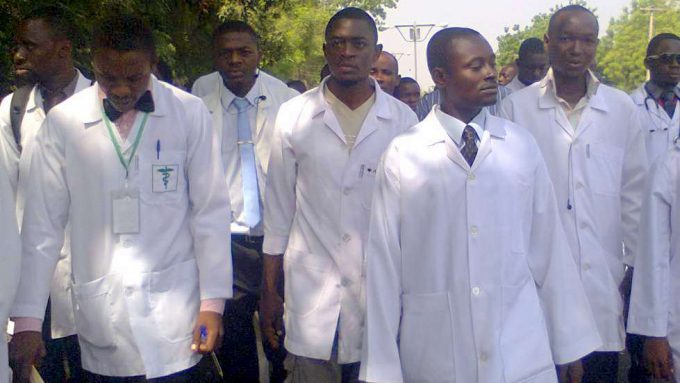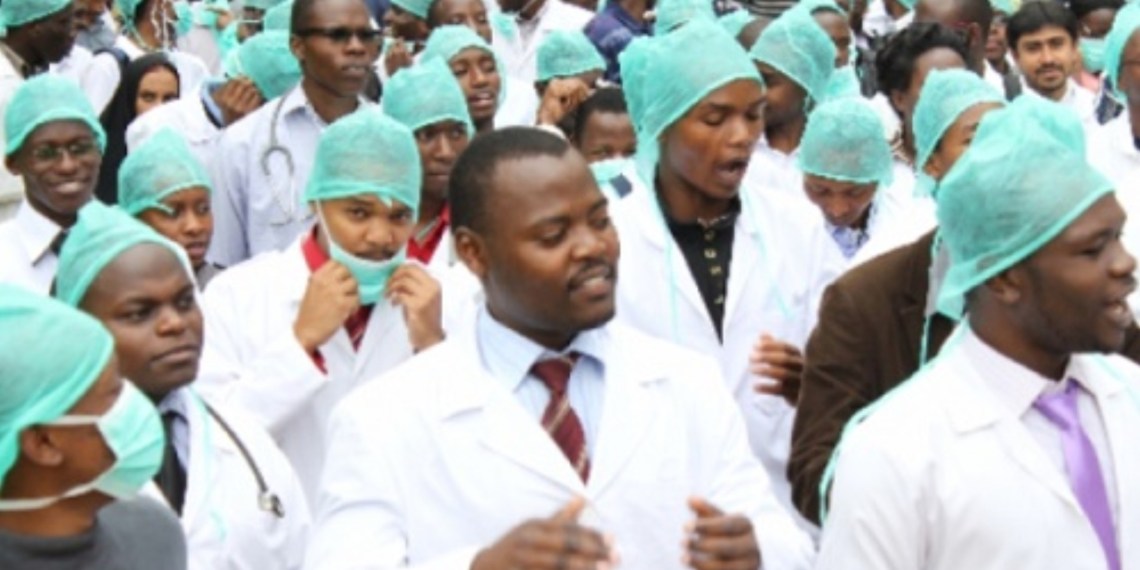Resident Doctors in FCT Demand Written Commitments as Warning Strike Disrupts Healthcare Services
Healthcare delivery across Nigeria’s Federal Capital Territory (FCT) faces fresh setbacks as the Association of Resident Doctors (ARD), FCT chapter, remains steadfast in its ongoing warning strike. The union insists that they will only call off the industrial action if the federal government delivers a formal, signed agreement outlining a clear plan and timeline for meeting their demands.
During an exclusive interview with PREMIUM TIMES on Thursday, ARD-FCT President Dr. George Ebong stressed that doctors are no longer willing to accept verbal reassurances that, he alleged, have often been ignored or broken by authorities in the past.
“All commitments must be put in writing this time,” Dr. Ebong stated firmly. “Previously, we trusted in their promises with nothing to show for it. Now, we want everything documented, signed by the Minister of FCT, Nyesom Wike, and time-bound,” he added.
Dr. Ebong remarked that even basic non-financial requests such as promotions and staff conversions have not been implemented, which has further eroded the trust between the doctors and the government.
“If the reply is that there are no available funds, that’s understandable to a point. But simple administrative matters that cost nothing also remain unresolved. How can we have confidence that anything will change?” he questioned.
Background: A System at Breaking Point
The ARD-FCT commenced a seven-day warning strike on Monday. The association’s grievances stem from unresolved issues they say have plagued the FCT health sector for years. Among the most pressing concerns are:
- Shortage of clinical staff leading to overwork and fatigue
- Stagnant welfare packages and delayed or unpaid salaries
- Unexplained salary deductions
- The absence of recruitment for clinical staff in FCT hospitals since 2011
- Rising psychological strain from excessive working hours and poor support
The strike, according to union leaders, is set to last until 15 September, after which the situation will be reviewed in line with the government’s response. This standoff, say observers, could become a defining moment for health sector industrial relations in the FCT and beyond.
Acute Impact on Patients and Communities
Even as resident doctors withdraw their services, Dr. George Ebong assured the public that alternative care arrangements are in place in collaboration with healthcare providers like Garki Hospital, the Federal Medical Centre, Jabi, and certain private facilities. This, however, has not averted disruption, as eyewitness accounts and live reports from PREMIUM TIMES showed stranded patients and limited skeletal services in some Abuja hospitals.
One expectant mother seeking antenatal treatment at a popular hospital in Wuse recounted being told to return after the industrial action. “Several critical treatments have been interrupted due to the strike,” said a relative who accompanied a patient, reflecting frustrations felt by many.
“We cannot continue to provide substandard, potentially dangerous healthcare just because the system is failing,” Dr. Ebong reiterated, highlighting the ethical dilemma many doctors face amid ongoing systemic neglect.
Multiple interviews with affected families, collected by PREMIUM TIMES, underscore both the urgency and the human cost of the crisis. Local NGOs, such as Nigeria Health Watch, have warned of worsening patient outcomes if solutions are not quickly brokered.
Systemic Issues and the Call for Reform
This is not the first time resident doctors in the FCT and nationwide have turned to strikes over long-standing grievances. According to data from the Nigeria Medical Association, there have been at least seven major industrial actions led by health workers between 2015 and 2023. Experts point out that many agreements reached after negotiations have reportedly not been fully implemented, leading to repeated cycles of industrial unrest.
While many public commentators acknowledge the immense pressures faced by Dr. Muhammad Pate, the serving Minister of Health and Social Welfare, they insist he is well-placed to initiate reforms. Dr. Ebong was keen to clarify: “Although the current minister inherited these problems, he now has a rare opportunity to address them with transparency and decisiveness.”
Health sector analysts, including Lagos-based public health expert Dr. Ayo Eke, argue that “sustainable solutions will require not just emergency fixes, but deep reforms in financing, policy enforcement, and staff welfare management.”
National Context: Parallel Strikes and Broader Healthcare Challenges
Compounding the FCT issues, the Nigerian Association of Resident Doctors (NARD)—which forms the backbone of Nigeria’s tertiary hospital system—also commenced a five-day warning strike last Friday. NARD leaders similarly blame federal inaction and delays over critical welfare terms. Their protest is an echo of the grievances in the FCT, but with national implications for patient care.
According to NARD, the government still owes medical personnel five months’ arrears related to the revised 25/35 per cent Consolidated Medical Salary Structure (CONMESS). Additional sore points include delayed release of the 2025 Medical Residency Training Fund (MRTF), and the controversial downgrading of medical certificates issued by the West African Colleges of Physicians and Surgeons—a move by the Medical and Dental Council that has sparked debate within the region.
State governments’ failures to pay the MRTF were described as “gross insensitivity” by NARD officials. Such actions, they argue, reinforce a perception among health workers that their essential services are undervalued.
Regional Perspectives: Comparisons and Lessons
Nigeria is hardly alone in facing healthcare workforce challenges. According to the World Health Organization, many countries in West Africa—including Ghana, Senegal, and Côte d’Ivoire—grapple with similar issues, such as brain drain, staff shortages, and wage disputes.
However, public health experts note that reforms in countries like Ghana, involving regular recruitment drives and clearer timelines for disbursements, have helped to reduce the frequency and impact of strikes. Nigerian policy advocates often cite these examples as proof that with political will and accountability, progress is possible.
A Way Forward: What’s at Stake?
As the warning strike enters a critical phase, stakeholders—from healthcare advocates to ordinary citizens—are watching closely. While the FCT ARD emphasises their willingness to return to work once their demands are formally addressed in writing, the ongoing disruption signals deeper systemic problems that go beyond salary arrears and promotions.
In the words of Dr. Ebong, “If we can get genuine, actionable, and transparent agreements, we remain ready to serve our people. But we need government to meet us halfway, not just with promises, but with real action.”
For patients and families affected by the current strike, this moment is a harsh reminder of how vulnerable Nigeria’s health infrastructure can be to policy failures and management lapses. Resolving the dispute requires renewed commitment from all parties, not only to restore daily services, but to rebuild trust and ensure long-term stability in the sector.
How is your local hospital coping with the ongoing strike, and what solutions do you think would best address these recurring challenges in our health sector? Share your thoughts below, and stay tuned to our platform for ongoing updates on this critical issue.
For support, reach out anytime at support@nowahalazone.com.
Join the conversation on Facebook, X (Twitter), and Instagram for real-time updates and community voices.
Your voice matters—help us spotlight healthcare stories that matter to West Africans, by West Africans!










